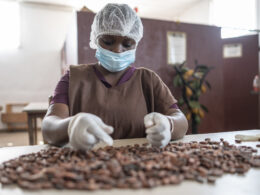Commodity trading is a fantastic career for top graduates and professionals. Not for the light-hearted, trading requires commercial skill and an analytic mindset. The key to success is a great understanding of the supply chain and physical flow. Do you have what it takes to become a top trader? Learn with tips about commodity trading careers.
Tips about Commodity Trading Careers
Commodity Trading Careers: An Amazing Career Path For Top-Notch Profiles
Commodity trading is an extraordinary career path; a genuinely complex profession that traces its origins to ancient times and trading routes.
Commodities trading is one of the most challenging, dynamic, and rewarding careers still available in the corporate jungle.
Good At Numbers, Good At People
The best commodity traders are very quick, driven individuals with excellent people skills.
They’ll need sharp commercial skills and a strategic mindset capable of solving unexpected complex problems and make hard decisions.
Start Young – Try To Survive
Typically careers in the industry begin in the mid-twenties, and hold strong as long as you enjoy the markets and make money.
The first years on the job tend to focus on the operational side of the business since a developing trader needs to learn about the physical trading flows before taking commercial decisions.
Progress As A Trader & Make Money
Candidates who show a good eye for business and a smooth understanding of the markets will quickly progress to more senior commercial roles.
Commodity trading salaries tend to be highly competitive and working hours are rather acceptable. But there is no free lunch, you’ll have to fight and earn your paycheck.
Travel the World
Commodities are produced all around the globe. In some cases, like tropical commodities, you’ll find yourself traveling to destinations along the Equator. In some other cases, locations may be mainly in Africa, Europe, or Eastern Asia.
In particular coffee is one of the best careers for travel lovers.

A Commodity Trading Career Is A Long-Term Project.
One of the best tips about commodity trading careers I can give you is to keep a long-term view in mind.
Commodities Trading Is About Surviving
Over the course of his trading career, a commodities professional will gain a deep understanding of his product/market, as well as a tight network of industry contacts. Industry knowledge and contacts are the key.
Industry insiders become more valuable year after year. In this sector trading experience and knowledge about the products you trade are vital human capital to succeed.
Commodity Traders Are Market Experts
Compared to investment banking, accountants, or marketing people, commodity traders require a much deeper understanding of the industry, supply chain, market dynamics, stakeholders, and products
Commodity traders make more money than they lose. They leverage their experience and contacts to make the best decision under any circumstances.
Traders are thus extremely valuable to their companies – they are highly knowledgeable, expensive to train, and hard to replace.

What Does It Take To Be A Successful Trader?
Successful commodity traders are quick analytical thinkers, good decision-makers, socially smart networkers, strategical movers, and commercially driven people.
Successful commodity traders are quick analytical thinkers, good decision-makers, socially smart networkers, strategical movers, and commercially driven people.
Additionally, you’ll have to be really good at multitasking and capable of setting priorities. Can you organize your time well while you handle the stress of the markets? Then you’ll far well in the commodity trading career path.
How Difficult Is It To Get A Trading Job?
Commodity traders are highly specialized professionals. Traders are hence very scarce and highly valuable to a company – as long as they achieve profit targets.
RELATED:
- 5 Tips That Will Land You A Commodities Trading Job
- How to Land Trading Jobs in Switzerland
- How To Land Green Coffee Trading Jobs
There are usually only a few hundred traders worldwide who specialize in a given commodity. It’s relatively rare to switch to a new commodity, say from coffee to crude oil trading.
Most Traders Specialize On A Specific Product And Region.
It takes years to learn how to trade commodities. Hence there are much fewer openings per year than in other fields such as accounting or consulting.
The labor market for commodity traders is tight. It’s difficult to break in, but job safety is good as long as you can trade successfully.

How Long Does It Take To Become A Commodity Trader?
Becoming a trader takes somewhere between 3 and 6 years.
Most traders start as trading trainees or trading operators. There is no shortcut to becoming Mark Rich, you need exposure to physical operations and years of market experience.
Depending on the company, you might be able to jump, say, from Trainee to Trading Assistant, or to start as Trading operator and jump directly as Trader (or Junior trader).
It is very rare to start in a trading desk as a Junior Trader without having done a good 2-3 years of operations and trade support.
Some companies such as Shell, Trafigura, or Cargill run excellent accelerated trading trainee programs, which speed up the process of becoming a commodities trader.

Trading Career Progression
As said, becoming a commodities trader is a long-term project. What can you expect?
Do You Want To Be A Commodity Trader?
The most common career path for traders starts as a Trading Trainee, Trading Support, or Trading Operator for 1-3 years.
Successful candidates are then promoted to Trading Assistants or Junior Traders.
Good Trading Assistants or Junior Traders may land a trading job as a Trading Executive or Trader and progressively promote to Senior Trader positions as they prove their skills in the market.
The final stage is usually Head Trader, which is one of the last market-focused positions before senior management. It’s relatively common that MD of trading desks or satellite offices/divisions are former Head Traders.
- Stage One
- Trading Trainee (from 6 months to 2-3 years)
- Trading Support (from a few months to a few years)
- Trading Operator / Financial Operator (1-3 years)
- Stage Two
- Trader Assistant (1-3 years)
- Junior Trader or Assistant Trader (1-3 years)
- Stage Three
- Trading Executive
- Trader (3-5 years)
- Senior Trader
- Stage Four
- Head Trader
Those with a great understanding of supply & demand, operations, and sales will develop faster.
Becoming A Trader Without Experience In Commodities:
It’s relatively difficult to break into the world of commodity traders without previous experience.
Trading companies often recruit directly through their network of contacts. Trust is paramount, and thus most trading desks recruit former customers suppliers. Experienced traders are head-hunted on a regular basis.
Only bigger trading houses such as ADM, Bunge, Sucafina, Gunvor, or Glencore recruit top graduates from leading universities.
Learn More
Becoming A Trader With Experience In Commodities:
Do you already have some trading or operations experience? It will be much easier to find your way towards a job as a commodity trader.
Commodities professionals are sought-after, and usually keep a close relation with head-hunting firms such as Selby Jennings, who is probably the best firm among the top commodities headhunters.
Conclusion & Next Steps
Do you want to become a commodity trader? Start learning about markets asap. Nowadays it’s clearly easier if you know how to code.
It is important that you understand the application process. Have a look at our tips on how to write a killer CV/Resumes, Cover letter, and what to expect in an interview.
Once you are familiar with the application process, find your target trading houses in our recruiting links.









Are you aware of any Power trading programs such as the Trader Development program with Shell? I am researching If I want to make a career shift into power trading. Thank you.
The Shell Trading Development Program is a fantastic school with excellent career perspectives in-house or at the large independent trading houses. Whether or not you reach a trading seat in the power desks will be a bit up to you but also depending on staffing requirements. What’s your background? Good luck with the application and keep us posted?
I am a 40 year old bond trader. I have been very successful in my career but I’d love a new challenge and I’ve always found the idea of commodity trading interesting. Is moving into this area realistically possible for someone like myself? And if so any tips on how to start? With thanks